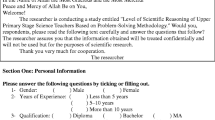Abstract
A multiple regression analysis of the relationship between prospective teachers' scientific understanding and Gender, Education Level (High School, College), Courses in Science (Biology, Chemistry, Physics, Earth Science, Astronomy, and Agriculture), Attitude Towards Science, and Attitude Towards Mathematics is reported. Undergraduate elementary science students (N = 176) in an urban doctoral-level university in the United States participated in this study. The results of this study showed Gender, completion of courses in High School Chemistry and Physics, College Chemistry and Physics, and Attitudes Toward Mathematics and Science significantly correlated with scientific understanding. Based on a regression model, Gender, and College Chemistry and Physics experiences added significant predictive accuracy to scientific understanding among prospective elementary teachers compared to the other variables.
Similar content being viewed by others
References
Anderson, R. D. (1983). A consolidation and appraisal of science meta-analyses. Journal of Research in Science Teaching 20: 479–509.
de Regts, H. W., and Dieks, D. (2003). Contextual approach to scientific understanding. Available at: http://philosci-archive.pitt.edu/archive/00001354/(date: 10/11/04)
Durant, J. R., Evans, G. A., and Thomas, G. P. (1992). Public understanding of science in Britain: The role of medicine in the popular presentation of science. Public Understanding of Science 1: 161–182.
Gross, P. R. (2000). Politicizing Science Education, Thomas B. Fordham Foundation, Washington, DC.
Kahle, J. B., and Meece, J. (1994). Research on gender issues in the classroom. In Gabel, D. L. (Ed.), Handbook of Research on Science Teaching and Learning, Macmillan, New York.
Kitcher, P. (1989). Explanatory unification and the causal structure of the world. In Kitcher, P., and Salmon, W. (Eds.), Scientific Explanations, University of Minnesota Press, Minneapolis.
Klapper, M. H., DeLucia, S., and Trent, J. (1993). A survey of scientific understandings: Comparing elementary and middle school teachers with college students, The National Center for Science Teaching and Learning, The Ohio State University, Columbus, OH.
Kruger, C., and Summers, M. (1990). A survey of primary school teachers' conceptions of force and motions. Educational Research 32: 83–93.
Kumar, D. D. (2003). Trends in post-secondary science in the United States. The Annals of the American Academy of Political and Social Science 585: 124–133.
Lawrence, F. (1986). Misconceptions of physical science concepts among elementary school teachers. School Science and Mathematics 86: 654–660.
Levin, J., and Jones, C. (1983, April). Elementary teachers' attitudes toward science in four areas related to gender differences in students' science performance. In A Paper Presented at the Annual Meeting of the American Eeducational Research Association, Montreal, Canada.
Lawson, A. E. (1983). Predicting science achievement: The role of developmental level, disembedding ability, mental capacity, prior knowledge, and beliefs. Journal of Research in Science Teaching 20: 117–129.
Marshall, J. S. (2003). A veteran's view of science education today. Review of Policy Research 20: 629–634.
Mervis, J. (2000). Sharp jump in teaching fellows draws ire from educators. Science 288: 21.
Miller, J. D. (2000). The development of civic scientific literacy in the United States. In Kumar, D. E., and Chubin, D. E. (Eds.), Science, Technology, and Society: A Sourcebook on Research and Practice, Kluwer Academic/Plenum Publishers, New York.
National Science Board. (2003). The Science and Engineering Workforce. Realizing America's potential, National Science Foundation, Arlington, VA.
National Research Council (1996). National Science Education Standards, National Academy Press, Washington, DC.
Shrigley, R. L. (1974). The correlation of scientific attitudes and science knowledge of prospective elementary teachers. Science Education 58: 143–151.
Tobias, S. (1999). Some recent developments in teacher education in mathematics and science. Journal of Science Education and Technology 8: 21–31.
Waksman, B. H. (2003). The scientist as school teacher. Journal of Science Education and Technology 12: 51–57.
Weiss, I. R., Banilower, E. R., McMohan, K. C., and Smith, P. S. (2001). Report of the 2000 national survey of science and mathematics education, Horizon Research Inc., Research Triangle Park, NC.
Author information
Authors and Affiliations
Rights and permissions
About this article
Cite this article
Kumar, D.D., Morris, J.D. Predicting Scientific Understanding of Prospective Elementary Teachers: Role of Gender, Education Level, Courses in Science, and Attitudes Toward Science and Mathematics. J Sci Educ Technol 14, 387–391 (2005). https://doi.org/10.1007/s10956-005-8083-2
Issue Date:
DOI: https://doi.org/10.1007/s10956-005-8083-2




